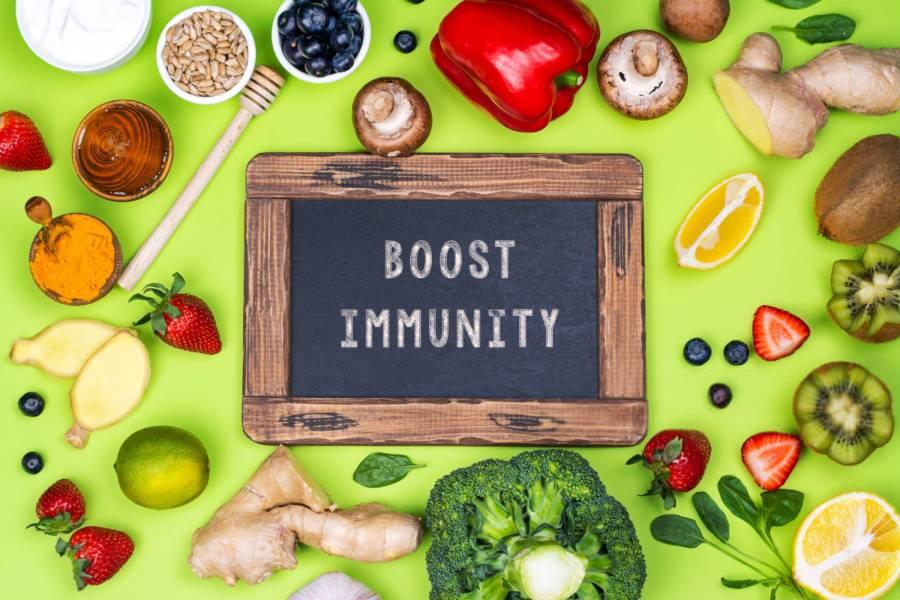How to boost your immune system

The immune system is a complex of protective mechanisms of the human body. It "guards" the body against viruses and bacteria, foreign substances that enter through water, air, and food, and can lead to diseases. The state of immunity indicates the body's ability to resist pests. If a person is prone to chronic diseases and often suffers from colds, this indicates weak immune protection.

There are two main types of immunity: innate and acquired. Innate immunity includes properties of the body determined genetically, i.e., those inherited from parents to children. A person is born with already established immunity and physical barriers to protect against the penetration of foreign bodies: skin, mucous membranes, hair.
When "hostile" substances enter the body, protection manifests as an increase in temperature, nasal mucus secretion—all aimed at getting rid of the pest.
Acquired immunity can be of two types:
- Active acquired: The protective reaction occurs after a disease has been contracted or a vaccine has been administered.
- Passive acquired: Develops when ready-made antibodies are introduced into the body in the form of serum by transmitting them to a newborn with colostrum from the mother or by intrauterine introduction of ready-made immunoreagents (pre-prepared antibodies necessary to neutralize pathogens, viruses, and other foreign substances).
Immunity is necessary for natural protection against unfavorable environmental factors. Without it, any allergen or virus becomes dangerous for a person. In the case of congenital immunodeficiency, a person can die even from a common cold.
The strength of protection depends on the person's health, i.e., the "level of immunity." During life, this indicator constantly changes, associated with both external and internal factors. Defensive reaction occurs not only to usual but also to new, previously unknown types of diseases (acquired immunity). The difference is that some have a stronger or weaker immune response. Therefore, even in one group with a source of infection, not everyone gets sick, and not everyone suffers the same way.
If a person suffers from viral diseases more than five times a year, it does not mean that the immunity is poor. It indicates that all five times he recovers, i.e., the immunity works, it is just weakened and needs strengthening.

Features of Immunity in Adults and Children
Scientists long believed that the immune system of a newborn is an immature version of an adult's immune system. But new research proves that children's T-cells (white blood cells that protect against diseases) surpass adults' T-cells in fighting numerous infections. This is designed by nature for the survival of infants in an unfamiliar environment.
The work of innate immunity begins immediately after the baby is born, but it does not work at full strength, development occurs gradually. Specific or acquired immunity is formed gradually. The body learns to distinguish "friends" from "foes" thanks to immunological memory.
Children's immune systems cope with infectious diseases differently than adults. Children, especially after they turn two, predominantly have innate immunity. When a disease penetrates a child's body, it immediately stands up for defense and attacks the pathogen. If all goes well, the immune system eventually wins the disease. At the same time, the child's body produces antibodies trained to attack the same or similar conditions. Thus, a child begins to form adaptive immunity, which predominates in adults.
Since the immune system of a child is more innate than adaptive, children are generally less susceptible to the COVID-19 virus. The reason for this stronger reaction to the virus lies in the ability of the innate immune system to cope with the disease immediately.
The only condition in which immune protection is very low is congenital immunodeficiency. Children with this diagnosis often die in childhood, or the disease eventually transitions to HIV/AIDS. However, modern medicine has developed protocols for antiretroviral therapy treatment, which can stabilize the condition.
Why Immunity Weakens
Immune defenses become weaker due to external and internal factors. The immunity is affected by the following negative factors and conditions:
- The ecological situation in which a person lives. In the water and air of cities, there is a large percentage of heavy metals, exhaust gases and toxins. They get into the respiratory tract and stomach, destroy the protective epithelium, which leads to a decrease in the protective barrier against bacteria and viruses.
- Unbalanced diet. Consumption of fast food, foods with preservatives, sugar and salt, smoked meats and dyes leads to weight gain. Obesity contributes to a decrease in immunity. Also unbalanced diet can provoke intestinal diseases (ulcer, gastritis), in which useful substances are poorly digested and the body is depleted.
- Dental problems. Cavities and gum disease are a source of constant infection in the oral cavity - part of the digestive system. This leads to metabolic disorders and rapid expenditure of immunity forces on the constant fight against infection.
Stress physical and psychological wear out the body, resulting in weakened immunity. - Dehydration. Causes fatigue and drying of mucous membranes, they are the first barrier that closes the way for foreign bodies.
Chronic sleep deprivation. Disrupts the balance of production of essential hormones and antibodies. That's why doctors recommend people who are sick to sleep more and rest to regain strength. - Lack of oxygen and sunlight. Prolonged stay in closed rooms, without fresh air and natural light becomes the cause of vitamin D deficiency, hypoxia (oxygen deprivation). It also reduces immune defense and resistance to infections.
- Deficiency of vitamins, minerals and fiber. These substances regulate metabolic processes in the body and protect against disorders.
- Frequent diets and fasting. Leukocytes have a protein nature and the lack of proteins in the diet becomes the cause of their decrease
- Lack of physical activity. A sedentary lifestyle leads to obesity, tissue hypoxia, deterioration of blood circulation, a decrease in cellular immunity.
These factors lead to a decrease in immune defense and resistance to disease. The immunity of the elderly is usually even weaker than that of the young.

How can an adult boost their immune system?
Noticing signs of weakened immune protection, many people start thinking about which medication can help quickly restore balance and improve their condition. However, there is no such "magic pill." What should be done? One needs to revise their lifestyle and try to eliminate the factors that have contributed to the decline in the body's protective function and strengthen it.
To determine the level of one's immunity, it is necessary to undergo a medical examination, have blood tests and other tests done. If a specialist identifies immunodeficiency or autoimmune diseases, specific therapy with intravenous medication complexes may be required. But in most cases, immunity can be boosted by simpler methods, following medical advice.
How much sleep is needed for the immune system to function?
Healthy sleep helps restore and maintain the normal functioning of the body, while a lack of it reduces immune protection. However, too much sleep (over 12 hours) does not provide additional benefits. To feel good and avoid health problems, an adult needs at least 7 consecutive hours of sleep per day. Teenagers from the age of 12 need longer night rest—8-10 hours.
It is advisable to organize a proper rest schedule, going to bed at the same time every day. If you couldn't get enough sleep at night, a 30-minute nap during the day can help "recharge" the body and continue the day with renewed energy.
Avoid dehydration
Fluid deficiency in the body not only reduces immune protection but also triggers headaches, cardiovascular diseases, and affects brain function. Dehydration leads to thickening of the blood, slow circulation, and tissue hypoxia.
For normal body functioning, adults should drink 2-3 liters of fluid per day, of which at least 2 liters should be plain clean water. In hot weather, it is necessary to drink more to prevent dehydration due to heavy sweating. In old age, it is especially important to monitor your drinking regime and carry a bottle of clean water with you.
The impact of physical exercise on immunity
Physical activity helps normalize circulation and muscle function, enriching organs with oxygen. Immune cells also need oxygenation.
However, moderate physical activities should be chosen, including:
- Brisk walking in the fresh air;
- Swimming;
- Yoga, stretching;
- Running;
- Dancing;
- Bicycling;
- Exercise routines, Pilates.
Besides being beneficial for health, physical exercise relieves stress. It's enough to spend 15-20 minutes a day on exercises or active movements to get charged with positive emotions and "get the blood flowing."

Manage stress
Physical and psychological overloads negatively affect the body's defensive reactions and its resistance to infections. A person feels exhausted and tired, which lowers the overall emotional tone and reduces immunity, leading to psychosomatic diseases.
Stress is a provoking factor and can increase the likelihood of developing hives and shingles. At the same time, skin reactions occur against the background of strong inflammation, which causes an "intense immune response." The appearance of stressful factors increases the levels of cortisol and adrenaline hormones, which interfere with the immune system's ability to respond adequately. Minimizing stress can be helped by relaxation techniques, meditation, yoga, walks in the fresh air, and simply interacting with close people. More on the topic you can read here.
¡Por favor activa el Javascript![ ? ]





